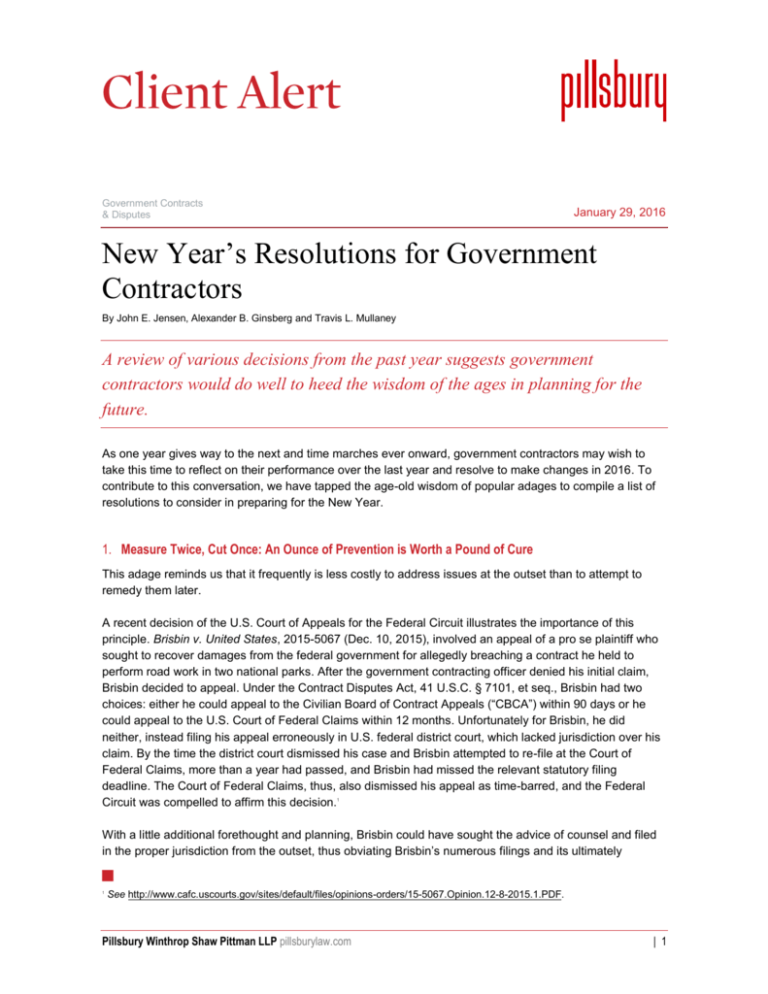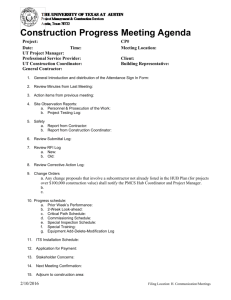
Client Alert
Government Contracts & Disputes
Government Contracts
& Disputes
January 29, 2016
New Year’s Resolutions for Government
Contractors
By John E. Jensen, Alexander B. Ginsberg and Travis L. Mullaney
A review of various decisions from the past year suggests government
contractors would do well to heed the wisdom of the ages in planning for the
future.
As one year gives way to the next and time marches ever onward, government contractors may wish to
take this time to reflect on their performance over the last year and resolve to make changes in 2016. To
contribute to this conversation, we have tapped the age-old wisdom of popular adages to compile a list of
resolutions to consider in preparing for the New Year.
1. Measure Twice, Cut Once: An Ounce of Prevention is Worth a Pound of Cure
This adage reminds us that it frequently is less costly to address issues at the outset than to attempt to
remedy them later.
A recent decision of the U.S. Court of Appeals for the Federal Circuit illustrates the importance of this
principle. Brisbin v. United States, 2015-5067 (Dec. 10, 2015), involved an appeal of a pro se plaintiff who
sought to recover damages from the federal government for allegedly breaching a contract he held to
perform road work in two national parks. After the government contracting officer denied his initial claim,
Brisbin decided to appeal. Under the Contract Disputes Act, 41 U.S.C. § 7101, et seq., Brisbin had two
choices: either he could appeal to the Civilian Board of Contract Appeals (“CBCA”) within 90 days or he
could appeal to the U.S. Court of Federal Claims within 12 months. Unfortunately for Brisbin, he did
neither, instead filing his appeal erroneously in U.S. federal district court, which lacked jurisdiction over his
claim. By the time the district court dismissed his case and Brisbin attempted to re-file at the Court of
Federal Claims, more than a year had passed, and Brisbin had missed the relevant statutory filing
deadline. The Court of Federal Claims, thus, also dismissed his appeal as time-barred, and the Federal
Circuit was compelled to affirm this decision.1
With a little additional forethought and planning, Brisbin could have sought the advice of counsel and filed
in the proper jurisdiction from the outset, thus obviating Brisbin’s numerous filings and its ultimately
1
See http://www.cafc.uscourts.gov/sites/default/files/opinions-orders/15-5067.Opinion.12-8-2015.1.PDF.
Pillsbury Winthrop Shaw Pittman LLP pillsburylaw.com
| 1
Client Alert
Government Contracts & Disputes
unsuccessful appeal to the Federal Circuit. While the Brisbin case is a somewhat extreme example,
confusion over the numerous filing deadlines and jurisdictional issues unique to federal procurement
litigation is pervasive among contractors. Brisbin is far from the only contractor this year to suffer the
draconian penalty of dismissal as a result of such confusion or otherwise miss an important deadline that
prejudiced its case. A little bit of forbearance (and expert advice) would have averted these outcomes.
2. Mind the Small Things: The Devil is in the Details
Bad results arise out of inattention to detail. We acknowledge that this adage, and many of the others
listed herein, may be applied to several of the examples we discuss. This should be no surprise, of course,
because it is always good advice to be detail-oriented.
Indeed, in Federal Acquisition Services Alliant Joint Venture, B-411842.2 (Nov. 9, 2015), the U.S.
Government Accountability Office (“GAO”) denied the bid protest of a contractor whose proposal was
excluded from the competitive range for a $100 million task order award. One of the agency’s bases for
excluding the protester from the competition was that its proposal was “riddled with grammatical errors . . .
spelling errors; lack of acronym identification . . . and punctuation errors.” The protester argued that these
factors were not identified in the solicitation as evaluation criteria. GAO disagreed, writing that offerors
were “responsible for submitting a well-written proposal with adequately-detailed information.”2 A thorough
proofread could have affected the outcome of this case.
3. Avoid Procrastination: The Early Bird Catches the Worm
Conventional wisdom dictates that it is better to act quickly and not to wait until tomorrow to do what can
be done today. Whether resulting from confusion regarding the proper forum, as in the Brisbin case
discussed above, or simple procrastination, delays in the context of federal procurement litigation are often
fatal to contractors’ cases.
For example, in National Telecommuting Institute, Inc. v. United States, 15-293C (Oct. 28, 2015) the Court
of Federal Claims dismissed a protest where the protester waited for six months after the adverse notice of
award to file its protest because it alleged that it had attempted to negotiate with the agency directly before
incurring the cost of litigation. Although there was no relevant statutory deadline for the protester to file its
complaint, the Court invoked the common law legal doctrine of “laches,” which bars claims by would-be
plaintiffs who unreasonably delay in pursuing those claims. As the Court stated: “a plaintiff cannot sit on his
rights in bringing a bid protest while the Government moves forward with a contract.” Because both the
government and awardee would be significantly prejudiced by the protester’s delay, the protest was simply
too late.3
Estes Bros. Construction, Inc. v. Dept. of Transportation, CBCA 4963 (Nov. 17, 2015) is another case in
which a contractor waited too long to enforce its rights and suffered the dismissal of its appeal. We
mentioned earlier that the Contract Disputes Act requires contractors to file their appeals to a Board of
Contract Appeals (here, the CBCA) within 90 days of receipt of a contracting officer’s final decision. In this
case, the contractor filed its appeal at 4:35 p.m. on the 90th day. Unfortunately, the relevant regulations
provide that close of business at the CBCA is 4:30 p.m. The CBCA, thus, dismissed the appeal for lack of
2
3
See http://gao.gov/assets/680/674264.pdf.
See https://ecf.cofc.uscourts.gov/cgi-bin/show_public_doc?2015cv0293-118-0.
Pillsbury Winthrop Shaw Pittman LLP pillsburylaw.com
| 2
Client Alert
Government Contracts & Disputes
jurisdiction because it was filed 5 minutes late. Harsh as this outcome may seem, one wonders why the
contractor waited until the last moment to file.4
In sum, do not delay or “sit on your rights.” Discuss your litigation options with counsel at the outset, and
leave yourself ample time to decide on and pursue a course of action.
4. Cede Authority When Necessary: Too Many Cooks Spoil the Broth
A critical part of being an effective leader is knowing when to let others take the helm. This notion can be
especially helpful in the small business context where it pays to allow small and disadvantaged companies
to perform an outsize portion of the work. In contrast, where contractors and owners cling too tightly to the
wheel, they may ultimately lose control of the situation.
In Potomac River Group, LLC, Appellant, SBA No. SIZ-5689 (Oct. 21, 2015), the Department of Defense
awarded a small business set-aside contract to Potomac River Group to conduct security interviews and
polygraph examinations. Global Solutions, Inc., a disappointed bidder, requested that SBA issue a size
determination that Potomac River Group was not small due to affiliation with its large business minority
owner, Intelligent Decisions Inc., which held a 48.54 percent stake in the company. Although Intelligent
Decisions owned less than 50 percent of the company, the imposition of certain supermajority voting
requirements allowed Intelligent Decisions to effectively veto certain actions. As a result, the SBA’s Office
of Hearings and Appeals held that “[w]hen a minority owner has the power to block ordinary actions
essential to operating the company, that owner has negative control, and that negative control mandates a
finding of affiliation.” Because Potomac River Group was deemed affiliated with Intelligent Decisions, it
could no longer meet the size requirements for the set-aside contract.
5. Be Truthful and Forthcoming: Honesty is the Best Policy
In the Government Contracting context, as in life, it pays to be honest and own up to one’s failings. The
Federal Acquisition Regulation contains several mandatory disclosure requirements covering such
subjects as fraud, labor violations, cybersecurity breaches, and human trafficking.5 Although it is essential
to consult with a lawyer and assess one’s legal position before making any disclosure, self-reporting of
misconduct can sometimes avert costly litigation and other negative consequences.
In one relatively recent example, a Pennsylvania continuing-care retirement community discovered and
self-reported a compliance error relating to its Medicare claims for skilled nursing facility services.6 Asbury
Health Center apparently collected $1.3 million in Medicare payments for post-hospital skilled nursing care
that were not supported by physician certifications and re-certifications required by Medicare regulations.7
After discovering the error during a compliance audit, the facility notified the U.S. Attorney's Office and the
4
See http://www.cbca.gov/files/decisions/2015/DANIELS_11-17-15_4963__ESTES_BROTHERS_CONSTRUCTION_INC.pdf.
See generally Dietrich Knauth, Self-Reporting Is All The Rage in Recent Contractor Regs, Law360 (Aug. 25, 2014).
6
See Department of Justice, U.S. Attorney’s Office Western District of Pennsylvania, $1.3M Settlement with Asbury Health
Center Resolves False Claims Act Allegations (Apr. 15, 2015), http://www.justice.gov/usao-wdpa/pr/13m-settlement-asburyhealth-center-resolves-false-claims-act-allegations; see also Alex Wolf, Pa. Retirement Home Inks $1.3M Deal to End FCA
Claims, Law360 (Apr. 15, 2015), http://www.law360.com/articles/643401/pa-retirement-home-inks-1-3m-deal-to-end-fcaclaims.
7
See id.
5
Pillsbury Winthrop Shaw Pittman LLP pillsburylaw.com
| 3
Client Alert
Government Contracts & Disputes
Office of Inspector General of the Department of Health and Human Services in July 2014.8 Ashbury Health
Center’s self-reporting appears to have allowed it to settle the matter without litigation.
6. Speak up!: The Squeaky Wheel Gets the Grease
When prudent to do so, speaking up early and often, even through litigation, can be an effective tool in
contractors’ interactions with the government.
One mechanism for “speaking up” is the often overlooked pre-award bid protest, which can be used, inter
alia, to challenge solicitation terms or the procurement plan itself. For example, in Global Technical
Systems, B-411230.2 (Sept. 9, 2015), a contractor filed a successful pre-award challenge to a solicitation
that failed reasonably to define the “engineering services” it purported to solicit, such that offerors could not
intelligently propose labor rates commensurate with such services. GAO recommended that the agency
clear up this ambiguity in the solicitation to “provide an adequate description of the engineering services
required under the contract or to otherwise allow offerors to compete on a common basis.”9
Communicating early and often with the government also was critical to the contractor’s recovery in
Servitodo LLC v. Dept. of Health and Human Servs., CBCA 4777 (Nov. 13, 2015), a case in which certain
government representatives ordered extra services to be performed under the relevant contract. In denying
the contractor’s request to be compensated for these additional services, the government asserted that the
services had not been ordered by the contracting officer – the official with formal contracting authority. In
ruling in favor of the contractor, the CBCA held: “in limited instances the Government can be bound, even
though the contractor cannot show specific direction emanating from one with actual contracting authority.
That limited exception comes into play where a contractor can show that even though the direction was not
given by one with contracting authority, the authorized official was either on actual or constructive notice
that the extra work was being directed.” Thus, because the contractor put the contracting officer on notice
of the additional services, the contractor’s appeal ultimately was successful.10
7. Unite in Solidarity: Stand Together or Fall Apart
There are many instances in which more is accomplished through team effort than through solo
undertaking. One example of this arises in the context of “claim sponsorship.” A government subcontractor
cannot file a claim directly against the government because the subcontractor is in privity of contract with
the prime contractor, not the government. Under the “Severin Doctrine,” however, a prime contractor is
permitted to “sponsor” a claim against the government on behalf of a subcontractor as long as the prime
contractor ultimately may be liable to the subcontractor in connection with the subject of the claim. Thus,
staying true to our adage, a subcontractor claim requires the prime and subcontractor to “stand together”
to pursue a subcontractor claim.
The CBCA’s recent denial of the government’s motion to dismiss in Aurora, LLC v. Dept. of State, CBCA
2872 (Dec. 21, 2015), reflects these principles. In that case, both the prime (Aurora) and subcontractor
(First Kuwaiti Trading & Contracting, Inc.) sought to challenge the government’s termination for default of a
contract to construct a consulate in Saudi Arabia. For reasons explained in the decision, the subcontractor,
First Kuwaiti, assumed a lead role in advancing the appeal “in the name of Aurora,” and First Kuwaiti’s
lawyer entered the only appearance. The CBCA considered these and other relevant facts, such as the
8
See id.
See http://gao.gov/assets/680/673628.pdf.
10
See http://www.cbca.gov/files/decisions/2015/POLLACK_11-13-15_4777__SERVITODO_LLC.pdf.
9
Pillsbury Winthrop Shaw Pittman LLP pillsburylaw.com
| 4
Client Alert
Government Contracts & Disputes
details of claim sponsorship provisions in agreements between Aurora and First Kuwaiti, but ultimately
found that it had jurisdiction over the appeal, reasoning: “Aurora, as the prime contractor, clearly had, and
has, standing to challenge the Government’s decision to terminate the contract for default. We know of no
legal ground to dismiss the matter simply because Aurora has, up until now, been willing to allow First
Kuwaiti to assume the laboring oar on its behalf. It is still Aurora’s appeal, and the Government is
answerable only to Aurora.”
8. Don’t Underestimate the Value of Settlement: A Bird in the Hand Is Worth Two in the Bush
Although litigation is sometimes necessary to bring resolution to an intractable conflict or difficult contract
dispute, it is not always the best option and one should not too hastily discount the possibility of settlement.
Creative contractors may look to future opportunities as a way to set-off losses on a current contract or
accept a reduced recovery to avoid the costs and risks of pursuing all that is owed. A proper risk / benefit
analysis may be an invaluable tool for assessing options and consultation with a good attorney will
facilitate the process. While such settlements are not often reported (another benefit of settling is the
possibility of avoiding publicity), settlements are frequent nonetheless.
In one recently reported settlement, a contractor and subcontractor reached settlement to halt litigation
over a $99 million dispute.11 Contractor JGB Enterprises Inc. was awarded a contract from the U.S. Marine
Corps for water and fuel systems project in 2011.12 JBG ultimately lost the contract, however, after a
disappointed bidder protested the award by arguing that JBG’s subcontractor for the project, Beta Fluid
Systems Inc., had falsely certified itself as a small business.13 JBG’s complaint alleged that “Beta, without
notice to JGB, had been acquired in 2006 by the McAleese Group of Australia, a large business, prior to
JGB's submission of the bid, thereby eliminating Beta's small business status.”14 The parties apparently
reached agreement to settle the matter, asking a New York federal judge to dismiss the suit because they
had reached an agreement satisfactory to both sides.15
If you have any questions about the content of this alert please contact the Pillsbury attorney with whom
you regularly work, or the authors below.
John E. Jensen (bio)
Northern Virginia
+1.703.770.7560
john.jensen@pillsburylaw.com
Alexander B. Ginsberg (bio)
Northern Virginia
+1.703.770.7521
alexander.ginsberg@pillsburylaw.com
Travis L. Mullaney (bio)
Northern Virginia
+1.703.770.7751
travis.mullaney@pillsburylaw.com
11
See Adam Sege, Marine Corps. Contractor, Subcontractor Settle $99M Row, Law360 (Jan. 15, 2016),
http://www.law360.com/articles/747392/marine-corps-contractor-subcontractor-settle-99m-row; see also JGB Enterprises Inc.
v. Beta Fluid Systems Inc., 5:14CV01439 (N.D.N.Y. 2016) (stipulation of dismissal).
12
See id.
13
See id.
14
See id.
15
See id.
Pillsbury Winthrop Shaw Pittman LLP pillsburylaw.com
| 5
Client Alert
Government Contracts & Disputes
Pillsbury Winthrop Shaw Pittman LLP is a leading international law firm with 18 offices around the world
and a particular focus on the energy & natural resources, financial services, real estate & construction, and
technology sectors. Recognized by Financial Times as one of the most innovative law firms, Pillsbury and
its lawyers are highly regarded for their forward-thinking approach, their enthusiasm for collaborating
across disciplines and their unsurpassed commercial awareness.
This publication is issued periodically to keep Pillsbury Winthrop Shaw Pittman LLP clients and other interested parties
informed of current legal developments that may affect or otherwise be of interest to them. The comments contained herein
do not constitute legal opinion and should not be regarded as a substitute for legal advice.
© 2016 Pillsbury Winthrop Shaw Pittman LLP. All Rights Reserved.
Pillsbury Winthrop Shaw Pittman LLP pillsburylaw.com
| 6







